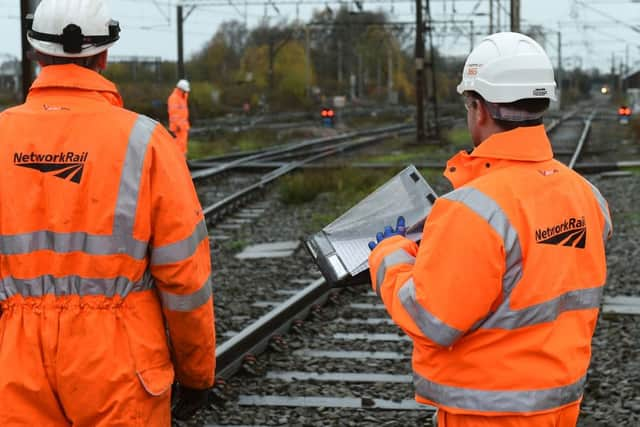Network Rail to lose monopoly of running Britain's train tracks


Transport Secretary Chris Grayling wants the publicly owned Network Rail to share its responsibility for running the tracks with private train operating companies.
He believes this major policy change will lead to more reliable services and help “transform the passenger experience”.
Advertisement
Hide AdAdvertisement
Hide AdNetwork Rail said it welcomed the plans as they will strengthen its existing alliances with operators.
Mr Grayling will use a speech at the Policy Exchange think-tank in London to explain that the relationship between the tracks and the trains needs to change because the lack of a coordinated approach can “make things much worse” when disruption occurs.
He will say: “In my experience, passengers don’t understand the division between the two. They just want someone to be in charge. They want their train to work. I agree with them.
“I intend to start bringing back together the operation of track and train on our railways ... I believe it will mean they run better on a day-to-day basis ... our railway is much better-run by one joined-up team of people.
Advertisement
Hide AdAdvertisement
Hide Ad“They don’t have to work for the same company. They do have to work in the same team.”
New franchises due to be let on the South Eastern and East Midlands routes in 2018 will have integrated operating teams overseeing both train services and infrastructure.
Similar action could be taken for other contract renewals over the coming years.
Network Rail chief executive Mark Carne said: “We strongly welcome these plans to bring more joined-up working within the industry.
Advertisement
Hide AdAdvertisement
Hide Ad“We have already devolved Network Rail into route-based businesses closer to customers, and the proposals announced today will build on the alliances we have created between these route businesses and train-operators.”
Paul Plummer, chief executive of the Rail Delivery Group - representing train operators and Network Rail - said: “Effectively managed teams focused on the same objectives will resolve problems and make progress more quickly.
“We will work with the Government to make sure that we meet customers’ needs and expectations, finding new ways of working and new sources of investment.”
A new organisation, separate to Network Rail and named East West Rail, will be created to secure private sector investment to design, build and operate the route between Oxford and Cambridge.
Advertisement
Hide AdAdvertisement
Hide AdThe western section of the line could be opened by 2024 and would cut journey times between Oxford and Bedford from two hours 20 minutes to just one hour one minute.
Mr Grayling will describe the closure of the rail link between Oxford and Cambridge in 1967 as “a decision we have lived to regret” as it is “one of our most important corridors”.
He will add that East West Rail will work “hand-in-glove” with the National Infrastructure Commission as it plans the development of the transport network in the area.
It will be an example of closer working across the industry.
Advertisement
Hide AdAdvertisement
Hide AdMr Grayling will face a protest by rail-workers when he arrives to make his speech on Tuesday, as it coincides with another strike in the long-running dispute over changes to the role of conductors on Southern Railway.
Members of the Rail, Maritime and Transport (RMT) union will attempt to speak to the minister to press their case, defending the role of guards.
RMT general secretary Mick Cash said: “This is the Tory Government dragging the railways back to the failed and lethal Railtrack model of the private sector running infrastructure.
“There is no question at all that this plan represents the piecemeal privatisation of Network Rail which, over a period of time, will see both operations and track run by the same bunch of companies who have failed so abysmally over the past two decades.”
Network Rail took over responsibility for infrastructure from Railtrack in 2002 after a series of fatal accidents, such as at Hatfield and Potters Bar.